China Asserts Climate Leadership Amid Trump’s Anticipated Return to Power

With Donald Trump likely returning to the presidency, China is using this moment to enhance its role in global climate diplomacy. At the COP29 in Azerbaijan, China showcased its climate finance contributions, while maintaining its status as a developing nation. This comes amid expectations of deteriorating U.S.-China relations, with opportunities for China to emerge as a more responsible leader in the global climate arena as the dynamics shift without strong U.S. involvement.
As Donald Trump is poised to return to the White House, China is strategically positioning itself as a global leader in climate diplomacy. During the COP29 climate talks held in Azerbaijan, China presented a cooperative stance and, for the first time, revealed its contributions to international climate finance, while firmly rejecting reclassification as a donor country. This approach is markedly different from last year’s COP28 interactions with the U.S., reflecting a softer tone in international negotiations. The current context presents opportunities for China, which could leverage Trump’s skepticism towards climate change and multilateral cooperation to strengthen its global image. Belinda Schaepe, a China analyst, highlighted that Trump’s presidency may enable China to portray itself as the more responsible power in the climate arena. However, to fully capitalize on this opportunity, China would benefit from announcing concrete commitments regarding aid and specific emission reduction targets by 2035. Despite calls from wealthier nations for improved transparency in climate financing, China has resisted pressures to be classified as a donor, fearing increased scrutiny over its contributions. Vice Premier Ding Xuexiang disclosed that since 2016, China has contributed $24.5 billion to international climate finance. German negotiator Jennifer Morgan acknowledged this figure while emphasizing the need for transparent reporting moving forward. Without the U.S. as a strong player in climate negotiations due to Trump’s election, other nations, including China, may fill the leadership void. President Biden reiterated his commitment to climate finance with an announcement of over $11 billion in bilateral support this year, contrasting sharply with Trump’s approach. China’s focus on climate matters stems from internal needs to combat severe environmental challenges, as it ascends as a leading force in clean energy markets. As the U.S.-China relationship becomes more tumultuous, the potential exists for China to navigate negotiations with Europe in a proactive manner. This shift could create a surprising dynamic in climate dialogues, where other nations adapt to an absence of U.S. influence.
The article discusses the shifting dynamics in global climate diplomacy as Donald Trump prepares for a potential second term as President of the United States. Historically, the U.S. has played a significant leadership role in climate discussions, but Trump’s positions and policies are often critical of international climate agreements and foreign aid, creating an opening for China to assert itself in this sphere. As the world’s largest emitter of greenhouse gases and a leader in renewable energy, China’s actions and commitments during international climate discussions are increasingly significant, especially in light of U.S. reticence.
In conclusion, as China navigates the complexities of international climate diplomacy amidst the anticipated return of Donald Trump, it is positioned to assume a more prominent leadership role. By emphasizing its contributions to climate finance while resisting pressure for classification as a donor, China aims to strengthen its global position. This development underscores the potential for altered dynamics in climate negotiations, particularly with diminished U.S. influence and the emergence of China as a cooperative partner.
Original Source: www.france24.com






